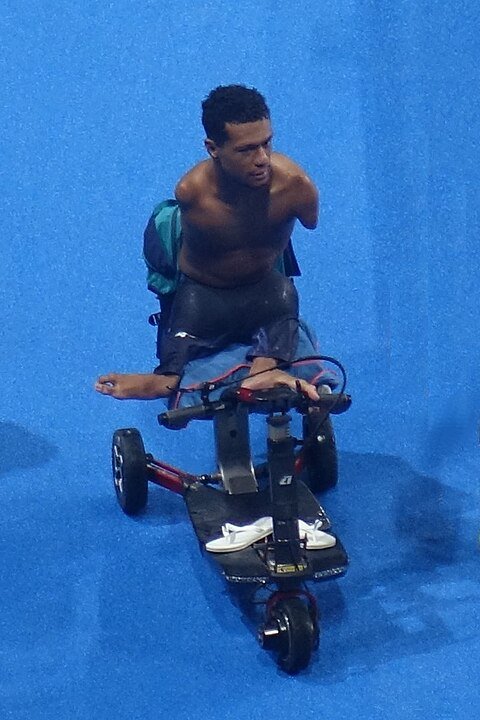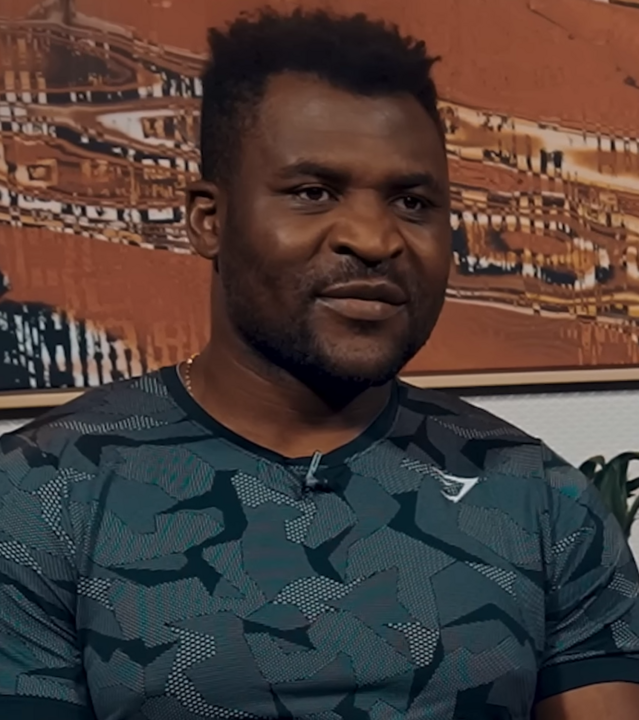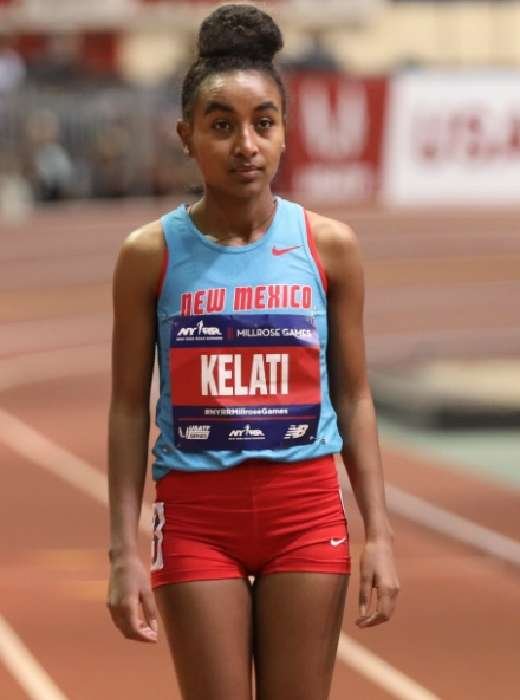In the gleaming aquatic center of Paris during the 2024 Paralympics, a slender figure slices through the water with mesmerizing undulations. No arms to pull, legs with limited function – yet he moves with a grace and speed that leaves spectators and competitors alike in awe. As he touches the wall, the scoreboard flashes a new world record. Gabriel Geraldo dos Santos Araújo has done it again.
“The Rocket Man,” as he’s affectionately known, raises his head above the water, a grin breaking across his face that seems to light up the entire arena. This is his third gold medal of the Games, completing a perfect trifecta and cementing his place in Paralympic swimming history. But to understand how this young man from a small town in Brazil became one of the most captivating athletes in the world, we need to dive deeper than the sparkling waters of Olympic pools.
Gabriel Araújo: Born Different, Destined for Greatness
The story begins in Santa Luzia, a municipality in Brazil’s Minas Gerais state, where Gabriel was born on March 11, 2002, with a rare congenital disorder called phocomelia. The condition left him with atrophied legs and no arms—a physical reality that would shape but never define his existence.
Growing up in Corinto before eventually settling in Juiz de Fora, Gabriel faced the kind of challenges most of us can hardly imagine. In a country where accessibility can be limited and socioeconomic inequality runs deep, being born with severe physical limitations meant navigating a world not designed for someone like him.
But Gabriel had a secret weapon in his corner – his mother, Ineida Magda dos Santos.
“She never treated me differently,” Gabriel Araújo once shared in an interview. “She wanted me to have a normal childhood, to find my own path.”
It was Ineida who first introduced her son to water, not knowing that this simple maternal act would eventually transform her son’s life and inspire millions around the globe.
The Accidental Swimmer
The pivotal moment in Gabriel’s journey came unexpectedly when he was 13 years old. His physical education teacher, Aguilar Freitas, spotted something in the teenager that perhaps even Gabriel hadn’t recognized in himself.
Without telling Gabriel Araújo or his mother, Freitas entered him into the Minas Gerais School Games (JEMG). Imagine the surprise when this untrained boy with no competitive swimming experience walked away with three gold medals. It was a revelation – not just to others, but to Gabriel himself.
“Swimming is the best thing that ever happened to me,” Gabriel has said repeatedly. “It completely changed my life.”
From that moment on, swimming wasn’t just a sport for Gabriel – it became his language, his freedom, his identity. Here was a medium where his physical differences weren’t limitations but the foundation for something extraordinary.
Cultivating the Rocket
Following his discovery, Gabriel began training seriously at clubs in Minas Gerais. His ascent in the sport was meteoric. By 2018, at just 16 years old, he was called up to the Brazilian Paralympic swimming team and began competing internationally.
What makes Gabriel truly unique is his swimming technique. Unable to use conventional arm strokes, he developed a distinctive undulating motion that has drawn comparisons to dolphins. Using powerful pelvic movements for propulsion, he rockets through the water with surprising speed and efficiency.
“When I’m in the water, I don’t feel disabled,” Gabriel Araújo once remarked. “I feel free – like I belong.”
His breakthrough on the international stage came at the 2019 Paralympic Swimming World Championships in London, where he claimed his first international medals. That same year, he added to his growing collection at the Lima Parapan American Games.
But it was at the Tokyo Paralympics in 2021 (delayed from 2020 due to the pandemic) where Gabriel truly announced himself to the world. At just 19 years old, he claimed two gold medals in the men’s 200m freestyle S2 and 50m backstroke S2, plus a silver in the 100m backstroke S2.
His competitor, Vladimir Danilenko, was the first to call him “The Rocket Man” – a nickname that perfectly captured both his speed and his rising trajectory in the sport. Gabriel embraced the moniker wholeheartedly.
“Rockets always go straight and forwards,” he said with his characteristic smile. “So I like the name.”
Paris 2024: The Perfect Hat-Trick
By the time the Paris 2024 Paralympics rolled around, Gabriel Araújo was no longer an underdog but a marked man – the champion everyone wanted to beat. The pressure was immense. Could he not only defend his Tokyo golds but upgrade that silver to gold as well?
The answer was an emphatic yes. In a performance that captivated the global audience, Gabriel completed his hat-trick of gold medals, winning the men’s 200m freestyle S2, 50m backstroke S2, and turning his Tokyo silver into gold in the 100m backstroke S2.
His victories weren’t just athletic achievements—they were spectacles. After each win, Gabriel Araújo would break into dance moves on the podium, his infectious joy spreading through the audience. Those celebrations became almost as anticipated as his races.
Tony Estanguet, President of Paris 2024, summed up Gabriel’s impact: “His victories and charisma have changed perceptions of difference and sent a powerful message that sport is for everyone with disabilities.”
The French crowds embraced him so completely that he was nicknamed “The Pelé of the Pools” by local media – high praise indeed in the world of sports.
Even more impressively, Gabriel had the honor of being Brazil’s male flagbearer during the Opening Ceremony, a testament to his status not just as an athlete but as a symbol of his nation’s resilience and spirit.
Gabriel Araújo: Beyond the Pool
What strikes anyone who meets Gabriel is not just his athletic prowess but his outlook on life. In a world that often focuses on what people with disabilities cannot do, he insistently redirects attention to what is possible.
“There is no secret to success,” he maintains with characteristic straightforwardness. “Only hard work.”
His coach, Fabio Antunes, confirms this mentality: “Gabriel never looks for shortcuts. His work ethic is extraordinary – not just in the pool but in everything he does.”
Gabriel’s adaptability extends far beyond swimming techniques. He uses his feet with remarkable dexterity for daily tasks, even operating his smartphone with his toes to maintain an active social media presence. Through these platforms, he shares glimpses of his life, training, and achievements, building a connection with fans worldwide.
His journey represents something profound about the human spirit. In a sport where most competitors use their arms to propel themselves through water, Gabriel Araújo – who has no arms – has become one of the most dominant athletes. The irony isn’t lost on him, but rather than dwell on limitations, he has channeled his energy into redefining what’s possible.
The Rocket’s Fuel
When asked about the source of his motivation, Gabriel points to multiple influences. He idolizes Brazilian Paralympic legend Daniel Dias, whose 27 Paralympic medals set a standard of excellence in para-swimming. But his most profound inspiration comes from closer to home.
“My mother always believed in me,” Gabriel says. “Even when I couldn’t believe in myself.”
Ineida Magda dos Santos recognized early on that while she couldn’t change her son’s physical condition, she could shape his mindset. Her insistence on treating him “normally” laid the groundwork for his remarkable independence and resilience.
His training regimen is as intense as any elite athlete’s. Six days a week in the pool, plus strength conditioning focused particularly on his core – the engine room for his unique swimming style. The S2 classification in which Gabriel Araújo competes is for athletes with severe physical limitations affecting arms, legs, and trunk, making his achievements all the more remarkable.
Lessons from the Rocket Man
Gabriel’s philosophy is refreshingly straightforward: “Never quit your dreams. Medals aren’t won just in the water – they’re earned through sacrifice and belief.”
His journey offers lessons that transcend sports. In a society often designed without consideration for those with different abilities, Gabriel has carved out his own path rather than waiting for accommodations. His success challenges perceptions about disability and human potential.
As Brazil’s first gold medalist at the Paris Paralympics, Gabriel Araújo has become an ambassador not just for para-sports but for a different way of thinking about challenges. He doesn’t deny the difficulties of his condition but refuses to be defined by them.
“When people see me swim, I hope they don’t just see a person with disabilities winning medals,” he reflects. “I hope they see possibilities they hadn’t imagined before.”
The Future of the Rocket
At just 22 years old during the Paris Games, Gabriel’s career is likely far from its peak. With multiple Paralympic golds and world championships already to his name, the question isn’t whether he’ll continue to succeed but how high he’ll soar.
Beyond his personal ambitions, Gabriel Araújo has begun mentoring younger athletes with disabilities, passing along not just technical swimming advice but his philosophy of perseverance. He advocates for greater accessibility in sports facilities across Brazil, helping to ensure that the next generation of differently-abled athletes won’t face the same barriers he did. “Swimming gave me a purpose,” he says. “I want everyone to have the chance to find what gives them that feeling.”
His profile on the Paralympic website continues to grow as his medal count increases, but statistics tell only part of the story. The true measure of Gabriel’s impact lies in the countless people who watch him and think: “If he can overcome such obstacles, what might I achieve?”
From One Boundary-Breaker to Another
If Gabriel Araújo’s remarkable journey has captivated you, you’ll find equal inspiration in the extraordinary story of India’s Sheetal Devi. Born without arms, this young archer has redefined precision sport by shooting with her feet. Like Gabriel in the water, Sheetal demonstrates unparalleled mastery in her element, proving that determination transcends physical limitations. Discover her in our feature, “Sheetal Devi: The Armless Archer“.
Image by Eponimm – Own work, CC BY 4.0, https://commons.wikimedia.org/w/index.php?curid=152244201




